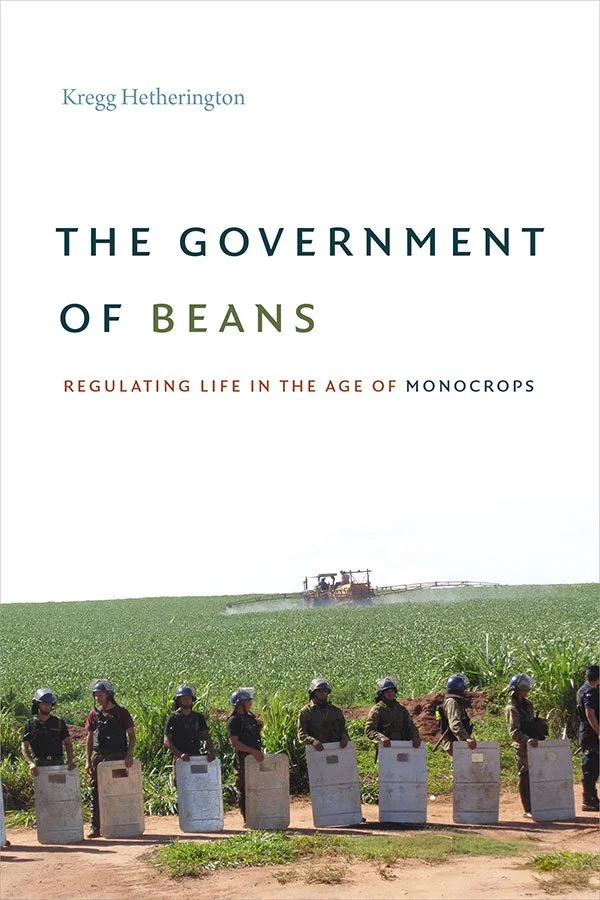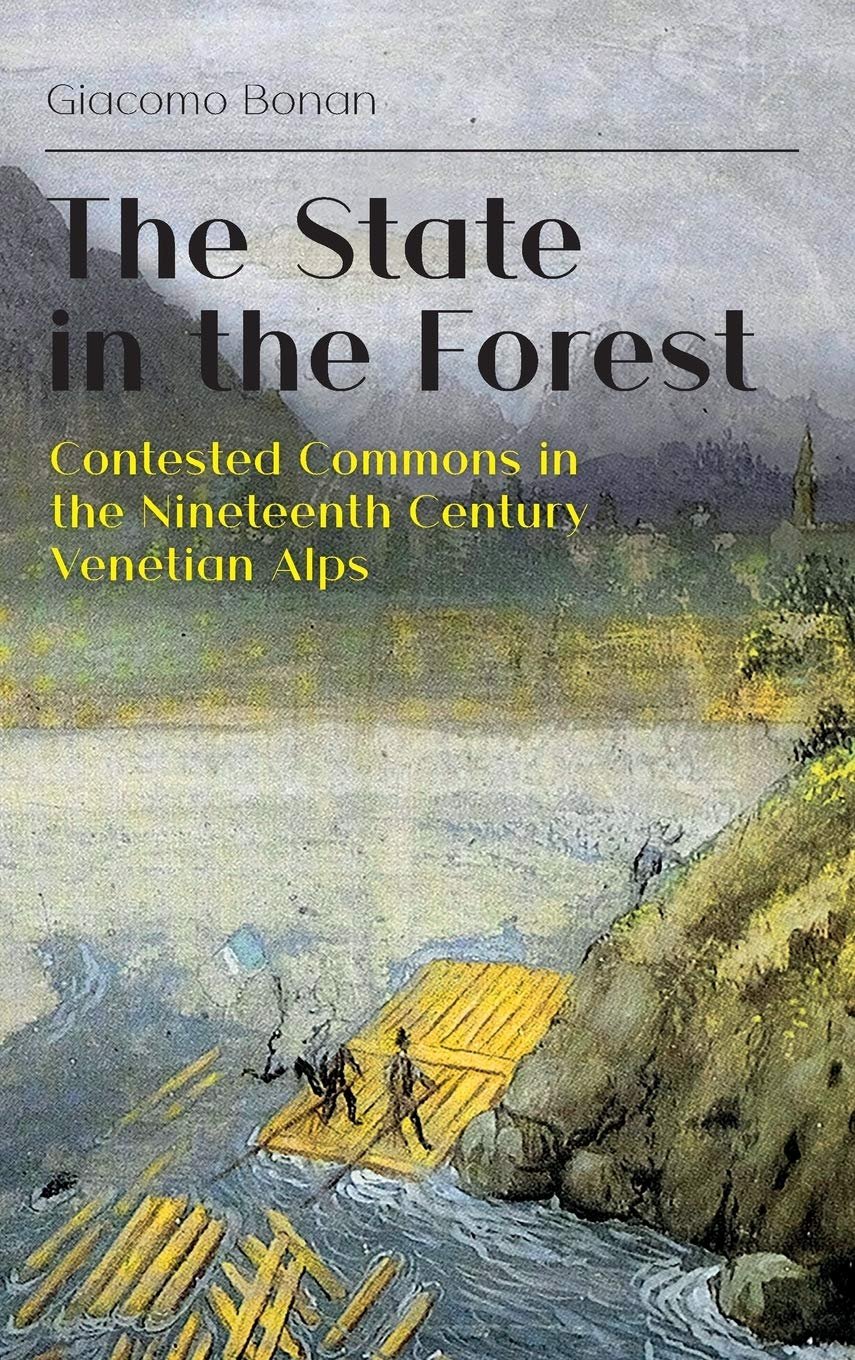
Contemporary Anthropology Reading Group (CARG)
CARG is a monthly reading group organized by the Environing Infrastructure team and open to staff and Ph.D. students of the Rachel Carson Center and the Department of Social and Cultural Anthropology at LMU Munich. The focus lies on monographs of contemporary anthropology, loosely linked to the themes of the project but without any commitment to a particular region.
CARG was initiated in November 2015 by Martin Saxer's “Highland Asia” ERC team, and over its first five years it featured 31 sessions. Beside Martin Saxer and Alessandro Rippa, Marlen Elders, Aditi Saraf, and Carolin Maertens were all involved in organising it -- and the reading group has expanded to include over 30 scholars.
For more info on previous CARG meetings, see: http://www.highlandasia.net/projects/carg.html.
CARG #44
“The government of Beans” by Kregg Hetherington
May 26, 2023
The Government of Beans is about the rough edges of environmental regulation, where tenuous state power and blunt governmental instruments encounter ecological destruction and social injustice. At the turn of the twenty-first century, Paraguay was undergoing dramatic economic, political, and environmental change due to a boom in the global demand for soybeans. Although the country's massive new soy monocrop brought wealth, it also brought deforestation, biodiversity loss, rising inequality, and violence. Kregg Hetherington traces well-meaning attempts by bureaucrats and activists to regulate the destructive force of monocrops that resulted in the discovery that the tools of modern government are at best inadequate to deal with the complex harms of modern agriculture and at worst exacerbate them. The book simultaneously tells a local story of people, plants, and government; a regional story of the rise and fall of Latin America's new left; and a story of the Anthropocene writ large, about the long-term, paradoxical consequences of destroying ecosystems in the name of human welfare.
CARG #43
“Nightmarch” by Alpa shah
March 24, 2023
Anthropologist Alpa Shah found herself in an active platoon of Naxalites—one of the longest-running guerrilla insurgencies in the world. The only woman, and the only person without a weapon, she walked alongside the militants for seven nights across 150 miles of dense, hilly forests in eastern India. Nightmarch is the riveting story of Shah’s journey, grounded in her years of living with India’s tribal people, an eye-opening exploration of the movement’s history and future and a powerful contemplation of how disadvantaged people fight back against unjust systems in today’s world.
The Naxalites have fought for a communist society for the past fifty years, caught in a conflict that has so far claimed at least forty thousand lives. Yet surprisingly little is known about these fighters in the West. Framed by the Indian state as a deadly terrorist group, the movement is actually made up of Marxist ideologues and lower-caste and tribal combatants, all of whom seek to overthrow a system that has abused them for decades. In Nightmarch, Shah shares some of their gritty untold stories: here we meet a high-caste leader who spent almost thirty years underground, a young Adivasi foot soldier, and an Adivasi youth who defected. Speaking with them and living for years with villagers in guerrilla strongholds, Shah has sought to understand why some of India’s poor have shunned the world’s largest democracy and taken up arms to fight for a fairer society—and asks whether they might be undermining their own aims.
By shining a light on this largely ignored corner of the world, Shah raises important questions about the uncaring advance of capitalism and offers a compelling reflection on dispossession and conflict at the heart of contemporary India.
CARG #42
“The State in the Forest” by Giacomo Bonan
January 27, 2023
The State in the Forest uses a case study of conflict over use of wood – the principal source of energy and the primary raw material at the time – to offer an environmental history of the nineteenth century ‘great transformation’. The focus is on Cadore, a supposedly peripheral area that was, in fact, at the core of the wood economy. The region comprises several valleys of the Eastern Italian Alps that constituted the main timber supply basin of Venice and other cities of the Veneto plain. With vivid and in-depth description of the role of forest resources for both local communities and state apparatus, the book sheds new light on key aspects of the nineteenth century agrarian world: the debate on wood shortage and the rise of scientific forestry; the social and environmental consequences of Napoleonic administrative reforms; the ambivalent relationship between privatisation of common lands and the restrictions imposed by state authorities on common and customary activities; the reorganisation of timber trade networks during the first steps of the industrial transition in continental Europe. Local socio-economic dynamics illuminate the interrelations between the macro and micro scales, showing how general transformations were perceived and experienced on the ground and how local actors were both subjects and agents of these events.
CARG #41
“The dawn of everything“ by David Graeber and David Weingrow
November 11, 2022
For generations, our remote ancestors have been cast as primitive and childlike--either free and equal innocents, or thuggish and warlike. Civilization, we are told, could only be achieved by sacrificing those original freedoms, or alternatively, by taming our baser instincts. Graeber and Wengrow show how such theories first emerged in the eighteenth century as a conservative reaction to powerful critiques of European society posed by Indigenous observers and intellectuals. Revisiting this encounter has startling implications for how we make sense of human history today, including the origins of farming, property, cities, democracy, slavery, and civilization itself.
Drawing on path-breaking research in archaeology and anthropology, the authors show how history becomes a far more interesting place once we learn to throw off our conceptual shackles and perceive what's really there. If humans did not spend 95% of their evolutionary past in tiny bands of hunter-gatherers, what were they doing all that time? If agriculture, and cities, did not mean a plunge into hierarchy and domination, then what kinds of social and economic organization did they lead to? What was really happening during the periods that we usually describe as the emergence of "the state"? The answers are often unexpected, and suggest that the course of human history may be less set in stone, and more full of playful, hopeful possibilities, than we tend to assume.
The Dawn of Everything fundamentally transforms our understanding of the human past and offers a path toward imagining new forms of freedom, new ways of organizing society. This is a monumental book of formidable intellectual range, animated by curiosity, moral vision, and a faith in the power of direct action.
CARG #40
“The Occupied Clinic",” by Saiba Varma
October 1, 2021
In The Occupied Clinic, Saiba Varma explores the psychological, ontological, and political entanglements between medicine and violence in Indian-controlled Kashmir—the world's most densely militarized place. Into a long history of occupations, insurgencies, suppressions, natural disasters, and a crisis of public health infrastructure come interventions in human distress, especially those of doctors and humanitarians, who struggle against an epidemic: more than sixty percent of the civilian population suffers from depression, anxiety, PTSD, or acute stress. Drawing on encounters between medical providers and patients in an array of settings, Varma reveals how colonization is embodied and how overlapping state practices of care and violence create disorienting worlds for doctors and patients alike. Varma shows how occupation creates worlds of disrupted meaning in which clinical life is connected to political disorder, subverting biomedical neutrality, ethics, and processes of care in profound ways. By highlighting the imbrications between humanitarianism and militarism and between care and violence, Varma theorizes care not as a redemptive practice, but as a fraught sphere of action that is never quite what it seems.
CARG #39
“The Ends of Kinship,” by Sienna Craig
June 25, 2021
For centuries, people from Mustang, Nepal, have relied on agriculture, pastoralism, and trade as a way of life. Seasonal migrations to South Asian cities for trade as well as temporary wage labor abroad have shaped their experiences for decades. Yet, more recently, permanent migrations to New York City, where many have settled, are reshaping lives and social worlds. Mustang has experienced one of the highest rates of depopulation in contemporary Nepal—a profoundly visible depopulation that contrasts with the relative invisibility of Himalayan migrants in New York.
Drawing on more than two decades of fieldwork with people in and from Mustang, this book combines narrative ethnography and short fiction to engage with foundational questions in cultural anthropology: How do different generations abide with and understand each other? How are traditions defended and transformed in the context of new mobilities? Anthropologist Sienna Craig draws on khora, the Tibetan Buddhist notion of cyclic existence as well as the daily act of circumambulating the sacred, to think about cycles of movement and patterns of world-making, shedding light on how kinship remains both firm and flexible in the face of migration. From a high Himalayan kingdom to the streets of Brooklyn and Queens, The Ends of Kinship explores dynamics of migration and social change, asking how individuals, families, and communities care for each other and carve out spaces of belonging. It also speaks broadly to issues of immigration and diaspora; belonging and identity; and the nexus of environmental, economic, and cultural transformation.
CARG #38
“Caring for Glaciers,” by Karine Gagné
May 7, 2021
Regional geopolitical processes have turned the Himalayan region of Ladakh, in northwest India, into a strategic border area with an increasing military presence that has decentered the traditional agropastoralist economy. This in turn has led to social fragmentation, the growing isolation of elders, and ethical dilemmas for those who strive to maintain traditional subsistence activities. Simultaneously, climate change is causing glaciers—a vital source of life in the region—to recede, which elders perceive as the consequence of a broken bond with the natural environment and the deities that inhabit the landscape.
Caring for Glaciers looks at the causes and consequences of ongoing social and cultural change in peoples’ relationship with the natural environment. It illuminates how relations of reciprocity - learned through everyday life and work in the mountains with the animals, glaciers, and deities that form Ladakh’s sacred geography - shape and nurture an ethics of care. Integrating contemporary studies of affect, landscape, and multispecies anthropology, Caring for Glaciers contributes to the anthropology of ethics by examining the moral order that develops through the embodied experience of life and work in the Himalayas.
CARG #37
“Animal Intimacies,” by Radhika Govindrajan
April 9, 2021
What does it mean to live and die in relation to other animals? Animal Intimacies posits this central question alongside the intimate—and intense—moments of care, kinship, violence, politics, indifference, and desire that occur between human and non-human animals.
Built on extensive ethnographic fieldwork in the mountain villages of India’s Central Himalayas, Radhika Govindrajan’s book explores the number of ways that human and animal interact to cultivate relationships as interconnected, related beings. Whether it is through the study of the affect and ethics of ritual animal sacrifice, analysis of the right-wing political project of cow-protection, or examination of villagers’ talk about bears who abduct women and have sex with them, Govindrajan illustrates that multispecies relatedness relies on both difference and ineffable affinity between animals. Animal Intimacies breaks substantial new ground in animal studies, and Govindrajan’s detailed portrait of the social, political and religious life of the region will be of interest to cultural anthropologists and scholars of South Asia as well.
CARG #36
“Thinking like a Climate,” by Hannah Knox
March 5, 2021
In Thinking Like a Climate Hannah Knox confronts the challenges that climate change poses to knowledge production and modern politics. Drawing on ethnographic fieldwork among policy makers, politicians, activists, scholars, and the public in Manchester, England—birthplace of the Industrial Revolution—Knox explores the city's strategies for understanding and responding to deteriorating environmental conditions. Climate science, Knox argues, frames climate change as a very particular kind of social problem that confronts the limits of administrative and bureaucratic techniques of knowing people, places, and things. Exceeding these limits requires forging new modes of relating to climate in ways that reimagine the social in climatological terms. Knox contends that the day-to-day work of crafting and implementing climate policy and translating climate knowledge into the work of governance demonstrates that local responses to climate change can be scaled up to effect change on a global scale.
CARG #35
“Care of the Species,” by John Hartigan Jr.
February 5, 2021
Across the globe, an expanding circle of care is encompassing a growing number of species through efforts targeting biodiversity, profoundly revising the line between humans and nonhumans. Care of the Species examines infrastructures of care—labs and gardens in Spain and Mexico—where plant scientists grapple with the complexities of evolution and domestication.
John Hartigan Jr. uses ethnography to access the expertise of botanists and others engaged with cultivating biodiversity, providing various entry points for understanding plants in the world around us. He begins by tracing the historical emergence of race through practices of care on nonhumans, showing how this history informs current thinking about conservation. With geneticists working on maize, Hartigan deploys Foucault’s concept of care of the self to analyze how domesticated species are augmented by an afterlife of data. In the botanical gardens of Spain, Care of the Species explores seed banks, herbariums, and living collections, depicting the range of ways people interact with botanical knowledge. This culminates in Hartigan’s effort to engage plants as ethnographic subjects through a series of imaginative “interview” techniques.
Care of the Species contributes to debates about the concept of species through vivid ethnography, developing a cultural perspective on evolutionary dynamics while using ethnography to theorize species. In tackling the racial dimension of efforts to go “beyond the human,” this book reveals a far greater stratum of sameness than commonly assumed.
CARG #34
“An Anthropology of Landscape,” by Christopher Tilley and Kate Cameron-Daum
January 8, 2021
An Anthropology of Landscape tells the fascinating story of a heathland landscape in south-west England and the way different individuals and groups engage with it. Based on a long-term anthropological study, the book emphasises four individual themes: embodied identities, the landscape as a sensuous material form that is acted upon and in turn acts on people, the landscape as contested, and its relation to emotion. The landscape is discussed in relation to these themes as both ‘taskscape’ and ‘leisurescape’, and from the perspective of different user groups. First, those who manage the landscape and use it for work: conservationists, environmentalists, archaeologists, the Royal Marines, and quarrying interests. Second, those who use it in their leisure time: cyclists and horse riders, model aircraft flyers, walkers, people who fish there, and artists who are inspired by it. The book makes an innovative contribution to landscape studies and will appeal to all those interested in nature conservation, historic preservation, the politics of nature, the politics of identity, and an anthropology of Britain.
CARG #33
“Improvised Lives: Rhythms of Endurance in an Urban South,” by AbdouMaliq Simone
November 20, 2020
The poor and working people in cities of the South find themselves in urban spaces that are conventionally construed as places to reside or inhabit. But what if we thought of popular districts in more expansive ways that capture what really goes on within them? In such cities, popular districts are the settings of more uncertain operations that take place under the cover of darkness, generating uncanny alliances among disparate bodies, materials and things and expanding the urban sensorium and its capacities for liveliness.
In this important new book AbdouMaliq Simone explores the nature of these alliances, portraying urban districts as sites of enduring transformations through rhythms that mediate between the needs of residents not to draw too much attention to themselves and their aspirations to become a small niche of exception. Here we discover an urban South that exists as dense rhythms of endurance that turn out to be vital for survival, connectivity, and becoming.
CARG #32
“On Kings,” by David Graeber and Marshall Sahlins
October 16, 2020
Description from HAU Books: “In anthropology as much as in popular imagination, kings are figures of fascination and intrigue, heroes or tyrants in ways presidents and prime ministers can never be. This collection of essays by two of the world’s most distinguished anthropologists—David Graeber and Marshall Sahlins—explores what kingship actually is, historically and anthropologically. As they show, kings are symbols for more than just sovereignty: indeed, the study of kingship offers a unique window into fundamental dilemmas concerning the very nature of power, meaning, and the human condition. Reflecting on issues such as temporality, alterity, and utopia—not to mention the divine, the strange, the numinous, and the bestial—Graeber and Sahlins explore the role of kings as they have existed around the world, from the BaKongo to the Aztec to the Shilluk and beyond. Richly delivered with the wit and sharp analysis characteristic of Graeber and Sahlins, this book opens up new avenues for the anthropological study of this fascinating and ubiquitous political figure.”












